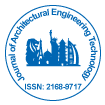Energy Performance Analysis of University Buildings: Case Studies at Sheffield University, UK
Received Date: May 15, 2014 / Accepted Date: May 29, 2014 / Published Date: Jun 05, 2014
Abstract
University energy consumption is becoming increasingly important both financially and environmentally. Indeed, government grant allocation now directly relates to environmental performance and it is essential that university spending on energy is reduced, without reducing the useful output or services offered by a well-regarded educational establishment, such as the University of Sheffield. Over the last four years, the University’s Estates and Facilities Management have collected energy data from a selection of five buildings: Crookesmoor Building, Humanities Research Institute, Northgate House, Graduate Research Centre and Regent Court. In this study, the five university buildings’ energy data is compiled and analysed in relation to energy benchmarks. Additionally, time-series analysis, building specification surveys, and comprehensive building classification were carried out. Finally, recommendations were made in terms of the buildings that offer most potential for improved energy savings in the near future. The findings indicated that, aside from a few exceptions, the buildings perform poorly in terms of gas consumption, whereas electricity consumption is generally acceptable. Moreover, gas consumption could be most significantly reduced, although improved heating management could be applied to all buildings. Electricity consumption is generally more acceptable, although scope for improvement remains, particularly in buildings with extensive IT facilities.
Keywords: Buildings; Sheffield university; Energy performances; Crookesmoor building
Citation: Altan H, Douglas JS, Kim YK (2014) Energy Performance Analysis of University Buildings: Case Studies at Sheffield University, UK. J Archit Eng Tech 3: 129. Doi: 10.4172/2168-9717.1000129
Copyright: ©2014 Altan H, et al. This is an open-access article distributed under the terms of the Creative Commons Attribution License, which permits unrestricted use, distribution, and reproduction in any medium, provided the original author and source are credited.
Share This Article
Recommended Journals
Open Access Journals
Article Tools
Article Usage
- Total views: 16912
- [From(publication date): 8-2014 - Apr 07, 2025]
- Breakdown by view type
- HTML page views: 12109
- PDF downloads: 4803
